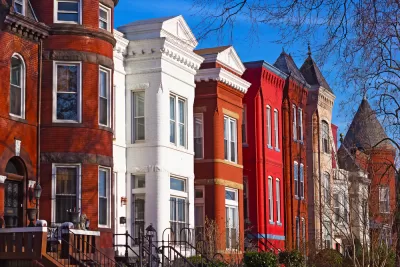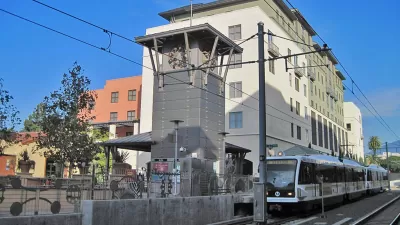As new construction favors single occupants and childless professionals, the capital's housing stock is increasingly boxing out families.

There are signs that D.C.'s housing stock is becoming less family-friendly. Mark Chambers writes, "According to an Urban Institute study, four and five bedroom units make up only eight and four percent of the homes in the city, respectively. Given that almost 12% of families that rent have four or more people, even the unsubsidized market for multi-bedroom rental homes is fairly tight."
Why is this happening? Developers can make greater profits catering to the professional demographic living in one- and two-person households. Building small but "luxury" units for them increases the rate of return on larger developments. At the same time, older buildings contain many of the units with three or more bedrooms. When they're redeveloped, one to two bedrooms becomes the norm.
"Finally, a more insidious and dangerous trend is appearing: language that implies the idea that families with children don't belong in neighborhoods with childless millennials and empty nester baby-boomers." Chambers advocates changes to the Comprehensive Plan to address the problem.
FULL STORY: Let’s make sure there are homes for families in DC

Planetizen Federal Action Tracker
A weekly monitor of how Trump’s orders and actions are impacting planners and planning in America.

Map: Where Senate Republicans Want to Sell Your Public Lands
For public land advocates, the Senate Republicans’ proposal to sell millions of acres of public land in the West is “the biggest fight of their careers.”

Restaurant Patios Were a Pandemic Win — Why Were They so Hard to Keep?
Social distancing requirements and changes in travel patterns prompted cities to pilot new uses for street and sidewalk space. Then it got complicated.

Platform Pilsner: Vancouver Transit Agency Releases... a Beer?
TransLink will receive a portion of every sale of the four-pack.

Toronto Weighs Cheaper Transit, Parking Hikes for Major Events
Special event rates would take effect during large festivals, sports games and concerts to ‘discourage driving, manage congestion and free up space for transit.”

Berlin to Consider Car-Free Zone Larger Than Manhattan
The area bound by the 22-mile Ringbahn would still allow 12 uses of a private automobile per year per person, and several other exemptions.
Urban Design for Planners 1: Software Tools
This six-course series explores essential urban design concepts using open source software and equips planners with the tools they need to participate fully in the urban design process.
Planning for Universal Design
Learn the tools for implementing Universal Design in planning regulations.
Heyer Gruel & Associates PA
JM Goldson LLC
Custer County Colorado
City of Camden Redevelopment Agency
City of Astoria
Transportation Research & Education Center (TREC) at Portland State University
Camden Redevelopment Agency
City of Claremont
Municipality of Princeton (NJ)





























